Good morning!
Greetings in the name of the Father, the Son, and the Holy Spirit on Palm Sunday.
“Praise God!
Blessings on the one who comes in the name of the LORD!
Blessings on the coming Kingdom of our ancestor David!
Praise God in highest Heaven!” (Mark 11:9b-10)

The entire city of Jerusalem was in an uproar as Jesus entered. “Who is this?” they asked. And the crowds replied, “It’s Jesus, the prophet from Nazareth in Galilee.”
It was the triumphant entry of Jesus Christ into Jerusalem on the Palm Sunday.
On the prior day, six days before the Passover celebration began, Jesus arrived in Bethany, the home of Lazarus—the man he had raised from the dead. A dinner was prepared in Jesus’ honor. Martha served, and Lazarus was among those who were with Him. Then Mary took a twelve-ounce jar of expensive perfume made from essence of nard, and she anointed Jesus’ feet with it, wiping His feet with her hair. The house was filled with the fragrance. It was worth one year’s wages. Mary gave her best to Jesus, who raised his brother, Lazarus, from the dead.
But Judas Iscariot, the disciple who would soon betray him, said, “That perfume was worth a year’s wages. It should have been sold and the money given to the poor.” Not that he cared for the poor—he was a thief, and since he was in charge of the disciples’ money, he often stole some for himself.
Jesus replied, “Leave her alone. She did this in preparation for my burial. You will always have the poor among you, but you will not always have me.”
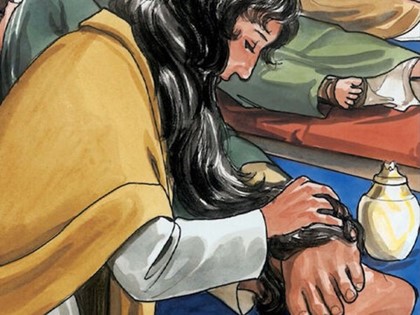
When all the peopled heard of Jesus’ arrival, they flocked to see him and also to see Lazarus, the man Jesus had raised from the dead. Then the leading priests decided to kill Lazarus, too, for it was because of him that many of the people had deserted them and believed in Jesus.
However, Jesus knew the hearts of the leading priests and what they would do to Him. Thus, when Jesus and his disciples were on the way up to Bethany near Jerusalem, Jesus once more began to describe everything that was about to happen to Him when Jesus went to Jerusalem. The disciples were filled with awe, and the people following behind were overwhelmed with fear. Taking the twelve disciples aside, “Listen,” the people said, “we’re going up to Jerusalem, where the Son of Man will be betrayed to the leading priests and the teachers of religious law. They will sentence Him to die and hand Him over to the Romans. They will mock Him, spit on Him, flog Him with a whip, and kill Him, but, after three days, He will rise again.”
Did the twelve disciples who followed Jesus for the last three years know what Jesus talked about? No. Although they lived together with Jesus and showed what Jesus did to them and the others, they did not know who Jesus was, the very reason why Jesus went up to Jerusalem, and what they would confront when they went into Jerusalem with Jesus. Jesus obediently followed God’s will and kept walking to Jerusalem to be the perfect and eternal sacrifice for all as the Lamb of God.
On the way, among the twelve disciples, James and John, the sons of Zebedee, came over and spoke to Jesus. “Teacher,” they said, “we want you to do us a favor.”
“What is your request?” Jesus asked.
They replied, “When you sit on your glorious throne, we want to sit in places of honor next to you, one on your right and the other on your left.”
Both wanted the glory, prestige, and power of the world, but Jesus was about to be the eternal sacrifice to forgive the sins of the world. They thought that Jesus would establish a kingdom on earth when he entered Jerusalem using Jesus’ supernatural power, which they experienced multiple times. Thus, they wanted to have their own share. Their earthly desire was completely out of place.
But Jesus patiently and lovingly said to them, “You don’t know what you are asking! Are you able to drink from the bitter cup of suffering I am about to drink? Are you able to be baptized with the baptism of suffering I must be baptized with?”
Jesus loved James and John. To Jesus, they were still spiritual babies to grow in Him. Most of all, Jesus knew soon they were about to confront a miserable failure of denying Jesus in fear of getting arrested like Jesus. Jesus also knew their miserable failure worked together for good in God’s love and mercy because their failure would become the source of transforming them into truly faithful followers of Jesus later. For example, John, who demanded the earthly glory ahead of the other ten disciples, later wrote the book of John, and the book of Revelation. Both books are filled with God’s love, mercy, and hope in Him in faith. Jesus, knowing the future of the disciples, kept patient and showed His love to the end.
“Oh yes,” they replied, “we are able!”
They did not know what they were talking about, but again Jesus lovingly and patiently told them the truth, “You will indeed drink from my bitter cup and be baptized with my baptism of suffering. But I have no right to say who will sit on my right or my left. God has prepared those places for the ones he has chosen.”
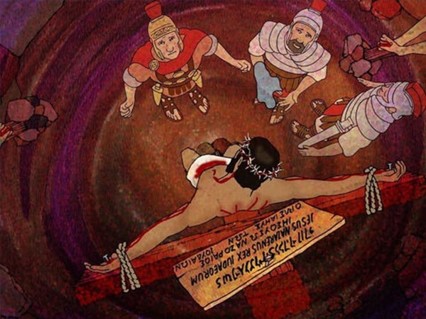
When the ten other disciples heard what James and John had asked, they were indignant. Sigh! Nobody understood why Jesus came and what Jesus was about to do in Jerusalem. Nobody truly understood Jesus’ teaching for the last three years.
So Jesus called them together and said,
“You know that the rulers in this world lord it over their people, and officials flaunt their authority over those under them. But among you, it will be different. Whoever wants to be a leader among you must be your servant, and whoever wants to be first among you must be the slave of everyone else. For even the Son of Man came not to be served but to serve others and to give his life as a ransom for many.” (Mark 10:41b-45)
Jesus finally explained the truth of His Kingdom – serving, not being served. Jesus also plainly explained why He was going up to Jerusalem — being the sacrifice as a random to forgive the sins of the world, including the disciples’ sins.
Jesus knew that soon he would be whipped, tortured, and crucified on the cross. He knew the excruciating pain and agony on a cross. He would bleed and be killed as the perfect Lamb of God to forgive the sins of all. But Jesus kept walking toward Jerusalem, ahead of His disciples.
As He came to the town of Bethphage on the Mount of Olives before entering Jerusalem, Jesus sent two disciples ahead. “Go into that village over there,” He told them. “As you enter it, you will see a young donkey tied there that no one has ever ridden. Untie it and bring it here. If anyone asks, ‘Why are you untying that colt?’ just say, ‘The Lord needs it.’”
So they went and found the colt, just as Jesus had said. And sure enough, as they were untying it, the owners asked them, “Why are you untying that colt?”
And the disciples simply replied, “The Lord needs it.” The owners gladly gave the colt. So they brought the colt to Jesus and threw their garments over it for him to ride on.
As he rode along, the crowds spread out their garments on the road ahead of Jesus. When Jesus reached the place where the road started down the Mount of Olives, all of His followers began to shout and sing as they walked along, praising God for all the wonderful miracles they had seen.
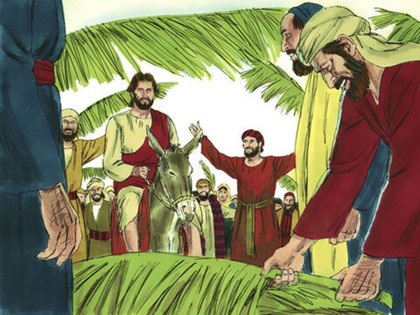
As leading the colt on which Jesus rode, the disciples looked around. They saw countlessly many people shouting and praising. They felt the crowds welcoming them. They started to think, “Finally, our journey is over. Yes, we have been right. Jesus will be the king. Then He will restore our Jewish nation and liberate us from the Romans. The last three years have been well worth it. When Jesus restores the nation, we will rule the nation together with Jesus.”
The disciples felt like they were flying over the sky. They smiled backed at the crowds. The crowds shouted and praised more and more. None doubted. But no one remembered what Jesus told them,
For even the Son of Man came not to be served but to serve others and to give his life as a ransom for many. (Mark 10:25)
Some of the Pharisees ran out, and among the crowd said, “Teacher, rebuke your followers for saying things like that!”
But Jesus replied, “If they kept quiet, the stones along the road would burst into cheers!”
Jesus’ authoritative answer immediately shut up the Pharisees. It was truly welcome news to the disciples. Jesus now talked back to the religious leaders like a king. The disciples were completely convinced what they were thinking was right. On the other hand, Jesus was completely obedient to God as the Lamb of God to the point of death, even death on a cross, to be the eternal and perfect sacrifice to atone for the sins of the world.
And being found in human form, he humbled himself by becoming obedient to the point of death, even death on a cross. (Philippians 2:8)
Jesus saw what was happening around Him. His disciples were expecting something that they should not look for. The crowds did not understand the meaning of His triumphant entrance to Jerusalem, but they just cheered Jesus because they needed hope to be released from their harsh lives under the Roman occupation. They wanted one who could liberate them from the Romans. Instead, they should have yearned for their eternal salvation that would never fade away nor be taken away by any means and power. However, the crowds kept praising with louder and louder voices without knowing when to stop,
“Hosanna! Blessed is he who comes in the name of the Lord, even the King of Israel!” (John 12:13b)
However, Jesus knew the people’s praising and shouting would soon cease. Instead, they would voice up against Jesus. Then they would keep shouting before Pontius Pilate, the Roman Governor, although the Roman Governor appealed to the same crowds to release Jesus according to the Jewish tradition of releasing a prisoner before the feast of Passover because even the Governor found Jesus had no sin at all to be sentenced to death. They shouted even more to overpower the Governor:
“Crucify him! Crucify him!” (Luke 23:21b)

Jesus foresaw what would come to Jerusalem after, and He wept. “How I wish today that you of all people would understand the way to peace. But now it is too late, and peace is hidden from your eyes. Before long, your enemies will build ramparts against your walls and encircle you and close in on you from every side. They will crush you into the ground, and your children with you. Your enemies will not leave a single stone in place, because you did not recognize it when God visited you.”
The huge stone walls, strong lofty towers, and massive gates gave a secure feeling to the people in Jerusalem. However, it was elusive. Their hearts only fixated on what they could see and touch, which might not be there with them the following day. After all, the next day was not their interest, but their interest was today’s earthly comfort and peace.
The people in Jerusalem just followed the crowds, and the leading priests and the teachers of religious law manipulated the crowds to their interests. Of course, they had no interest in the crowds at all but themselves. They felt that they deserved to be greeted at marketplaces by the people. Their goal was to keep their prestige, respect, and earthly power, neither serving God nor being humble servants for the people as Jesus did – not to be served, but to serve.
Jesus replied, “And you experts in the law, woe to you, because you load people down with burdens they can hardly carry, and you yourselves will not lift one finger to help them. (Luke 11:46)
Jesus, His disciples, the crowd, and the religious leaders had all different ideas about Jesus’ triumphant entry to Jerusalem. Even a single person understood what Jesus was about to do in Jerusalem.
Upon arrival, Jesus entered the Temple in the center of Jerusalem. What Jesus saw was the people buying and selling animals for sacrifices. It was a legitimate business in the Temple because, at that time, carrying sacrificial animals to Jerusalem from people’s hometowns was not practical. The Temple allowed people to come with money and buy their sacrificial animals. Then it became a big business for both the sellers and those working in the Temple. The Temple ground became a huge marketplace for selling, buying, and exchanging money. Money was flowing, and everyone involved was happy.
Jesus could not believe what he saw. Jesus knocked over the tables of the money changers and the chairs of those selling doves, and he stopped everyone from using the Temple as a marketplace. He said to them, “The Scriptures declare, ‘My Temple will be called a house of prayer for all nations,’ but you have turned it into a den of thieves.”
When the leading priests and teachers of religious law heard what Jesus had done, they were truly annoyed. Jesus finally got under their skin by disrupting the huge legitimate money-making business in the Temple. Nobody had challenged. Any of such attempts were unthinkable at that time because the religious leaders strictly prohibited any criticisms in the name of God.
However, Jesus dared to interfere with their religiously approved business in the sacred Temple. They felt Jesus was against them and indeed against God. Therefore, they determined not to let Jesus alone in the name of God and, of course, indeed, in their own interest. From that day, they began planning how to kill Jesus. But they could not do it immediately because they were also afraid of Jesus due to the people who were so amazed at his teaching. What they had to do was to leverage herd mentality to wedge Jesus from their minds and hearts. They gathered together and discussed. They carefully put together a plan to isolate Jesus by making the crowds on their side and then kill Jesus in the hands of the Romans so that they would continue to be clean.
The triumphant entry of Jesus into Jerusalem was the prelude to the fulfillment of God’s eternal salvation. The vicious religious leaders were busy executing their plan to kill Jesus. But the people of Jerusalem praised and shouted for Jesus because they believed Jesus was their earthly messiah and savior, who would save them from the Romans.
Pontius Pilate, the Roman Governor, had no idea at all what was going on. The religious leaders were about to force him to crucify Jesus on a cross by putting pressure on the Governor using the crowds. The Roman Governor was about to become a robot of the religious leaders.
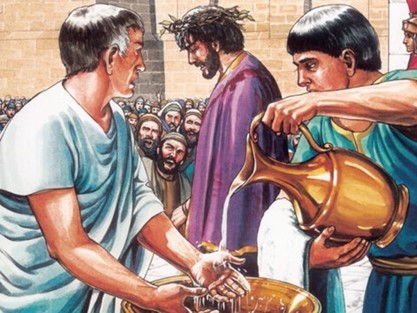
On the other hand, Heaven patiently waited for the most glorious moment that Jesus Christ was about fulfilling the eternal salvation for all by being crucified on a cross as the perfect lamb of God. Jesus Christ was about to wash away all sins once and for all. It was the day of Palm Sunday in Jerusalem about two thousand years ago.
Now, we know all truth and what Jesus did for us. Thus, we can sing praises to Him because Jesus forgave all sins on the cross, and we became His Eternal Children whom God loves forever. Today, we can truly praise and shout in joy, not like the crows in Jerusalem, but as His Eternal Children. Let’s together on this glorious and blessed Palm Sunday and praise together with the loudest voice,
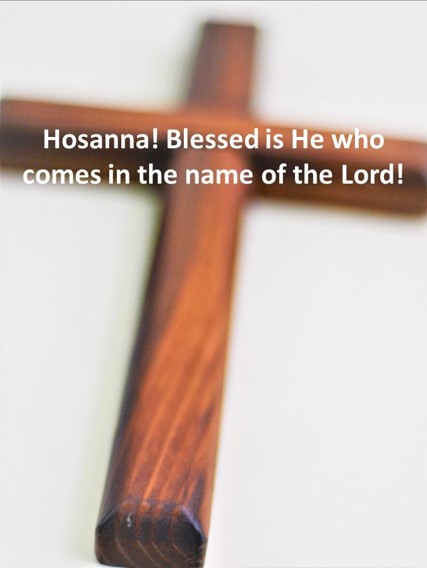
“Hosanna to the Son of David!” “Blessed is he who comes in the name of the Lord!” “Hosanna in the highest heaven!” (Matthew 21:9b)
